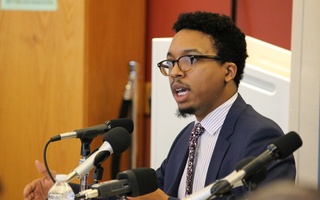Criticism of media coverage of the Iraq war and the effects that it has on the public dominated a speech given yesterday at the Kennedy School of Government (KSG) by Michael A. Massing ’74, contributing editor for the Columbia Journalism Review and the New York Review of Books.
The speech, entitled “The Glaring Gap in Press Coverage of Iraq,” explored the main areas that Massing said get little coverage in the press—including the U.S. military’s checkpoint strategy, the use of convoys, and the counter-insurgency strategy of the U.S.
Massing, the author of “Now They Tell Us,” a collection of articles about the media’s coverage of the Iraq war, also discussed the effects that the press has on America’s reaction to the war.
“It’s something that’s really on the table now,” said Alex S. Jones, director of the KSG’s Shorenstein Center on the Press, Politics and Public Policy, in regards to the media’s complex relationship with the war in Iraq.
“I’m just exasperated by the lack of good coverage,” Massing said in his speech. “I think that the thinness of that coverage reflects the general lack of familiarity that journalists have with the region.”
Attendees took issue with the media’s narrow scope when it comes to covering events in Iraq.
“The problem...is that we’re getting a very narrow picture of the whole war,” said David Anable, a fellow at the Shorenstein Center. “I’m looking for a broader context.”
In a discussion that took place after the speech, participants offered various explanations for what they considered to be inadequate press coverage of the war in Iraq.
Massing pointed to security problems in Iraq and the U.S. military’s dominant influence for the lack of thorough coverage, but noted that military dominance is not completely to blame.
Massing also said the media’s fear of causing a negative reaction from the American public might be responsible for the incomplete coverage.
According the Massing, this fear spurs some factions of the press to resort to “yellow-ribbon journalism”—human-interest coverage of men and women in service or on the home front, rather than military policy or diplomacy—which undermines the integrity of the press as an institution.
“When a nation has troops in the field, it is just so hard to write about them in other ways than this,” he said, referring to yellow-ribbon journalism.
Despite disagreement over why the press has not fully covered Iraq, many participants touted an overhaul of the journalism field.
“There is this big institutional failure,” said Massing. “There’s an accurate awareness...that they blew it.”
Nick Danilov, a professor from Northeastern University and former reporter for U.S. News and World Report, agreed with Massing.
“I’m not sure that [journalism] is a profession,” said Danilov, during the discussion period. “We are very disorganized.”
Massing suggested that this failure is adversely affecting American efforts in Iraq and warned that unless coverage of the area is modified, America will continue having difficulty in Iraq.
“Unless we start looking at this more closely...we don’t have a sense of what our current strategy is doing and if there are alternatives,” he said.
However, Jones suggested that the relationship between the press and the war in Iraq is a little more complicated than this.
“I think it’s also something that is much more complicated than just the way the news media reports on the war,” he said during the event.
At the end of the hour-long event, Massing reminded attendees to be realistic about the influence of the press.
“I think that we can’t exaggerate the press’s influence...[but] I don’t think that we should also underemphasize the role,” he said.
Read more in News
Harvard Dedicates New Gov BuildingRecommended Articles
-
FRESHMAN DEBATING CLUB.The second trial debate to choose speakers from the Freshman Debating Club to speak against a team from the Sophomore
-
New Shorenstein Fellows Include CIA Expert, HistorianFive scholars examining subjects ranging from press coverage of the Central Intelligence Agency to the interplay of politics and media
-
Over the WireCANDERRA--Government leaders told the House of Representatives today that the Japanese are massing strong forces at Rabul. Prime Minister John
-
Former Times Editor Weighs in on 2016 Elections CoverageJill E. Abramson ’76, the former executive editor of The New York Times and lecturer in the English department, lamented the lack of in-depth investigative reporting this election cycle.
-
 Journalist Criticizes Media’s Role in Trump-Era Politics
Journalist Criticizes Media’s Role in Trump-Era Politics













